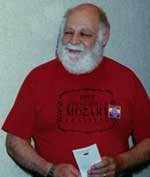 "On this day, the Church remembers all of the faithful departed who died peaceable deaths, … these were ordinary people…" according to the useful Episcopal liturgical website Mission St. Clare. I like the idea of remembering with delight the people who've been important to us. Today I remember a friend and mentor who left us in 2001 at the age of 66.
"On this day, the Church remembers all of the faithful departed who died peaceable deaths, … these were ordinary people…" according to the useful Episcopal liturgical website Mission St. Clare. I like the idea of remembering with delight the people who've been important to us. Today I remember a friend and mentor who left us in 2001 at the age of 66.Tim Sampson was certainly not ordinary, in the sense of "unremarkable;" however he would never have thought of himself as anyone special, so in that sense, this does seem to be his day. As far as his being one of the "faithful," I really don't know what that means: I think of Tim as a Jewish-Quaker-Buddhist-anarcho-commie-Santa Claus, so I am sure he fits under that word somehow. In any case, his life was the art form of a man who found ways to live out what he believed in.
Tim lived for the struggle for justice and his notion of justice was wide and deep. His concerns bridged divides that often act as barriers between people who ought to be on the same side.
- He was an academic, teaching for 30 years in the School of Social Work at San Francisco State University. The campus remembered him as uniquely present to students, joining their marches and picket lines.
- He was a union activist, not only as a member and officer of his own union, the California Faculty Association, but also in support of the bleeding edges of labor such as the United Farm Workers and Justice for Janitors. Not long before he died, he was pushing the AFL-CIO to organize and utilize the energies of retirees.
- He was a community organizer in the Saul Alinsky and Fred Ross Sr. traditions who had worked with the National Welfare Rights Organization, the Legal Services Corporation, Highlander Center in Tennessee, and the National Campaign for Jobs and Income Support of the Center for Community Change.
- He supported movements for racial justice throughout his life, training organizers who came up with the Center for Third World Organizing in Oakland, serving on the board of the Applied Research Center, and joining Californians for Justice at its beginning.
Organizing to take political and economic power from the strong for the weak is hard, frustrating work that can leave its practitioners cynical and bitter. Tim never succumbed to those temptations. He was enthusiastic about each new campaign, thoughtful, hopeful and warm toward those he worked with. Forgoing the brash, macho posture many organizers of both sexes assume,Tim taught aspiring organizers that:"The flowers of organizational relations grow from personal interest, kindness, and cultivation."
For many organizers, building power for the weak is about harnessing anger and resentment against the powerful. And certainly where injustice and oppression are the rule, anger can be righteous and useful. But it can also be a corrosive addiction and Tim knew that.
The older I get, the more I know he was right.When I started organizing, one of my primary motivations, which I came to cherish, was anger. But as my life went on, I learned there is a more powerful force in the struggle for social change, and that is love.
¡Tim Sampson, presente!
No comments:
Post a Comment